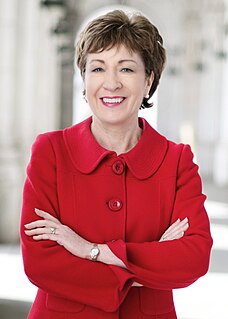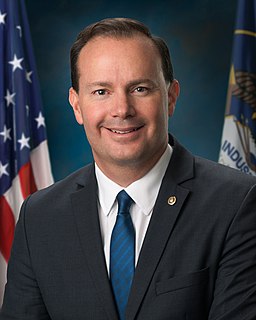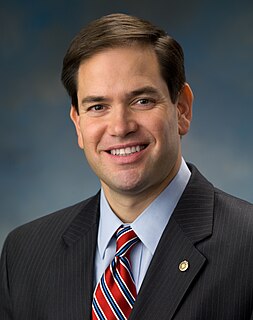Related Research Articles

The North American Free Trade Agreement was an agreement signed by Canada, Mexico, and the United States that created a trilateral trade bloc in North America. The agreement came into force on January 1, 1994, and superseded the 1988 Canada–United States Free Trade Agreement between the United States and Canada. The NAFTA trade bloc formed one of the largest trade blocs in the world by gross domestic product.

The War Powers Resolution is a federal law intended to check the U.S. president's power to commit the United States to an armed conflict without the consent of the U.S. Congress. The resolution was adopted in the form of a United States congressional joint resolution. It provides that the president can send the U.S. Armed Forces into action abroad only by declaration of war by Congress, "statutory authorization", or in case of "a national emergency created by attack upon the United States, its territories or possessions, or its armed forces".

Huawei Technologies Co., Ltd. is a Chinese multinational technology corporation headquartered in Shenzhen, Guangdong, China. It designs, develops and sells telecommunications equipment, consumer electronics and various smart devices. Huawei was ranked the second-largest R&D investor in the world by the EU Joint Research Centre (JRC) in its 2021 EU Industrial R&D Investment Scoreboard and ranked fifth in the world in US patents according to a report by Fairview Research’s IFI Claims Patent Services.

Susan Margaret Collins is an American politician serving as the senior United States senator from Maine. A member of the Republican Party, she has held her seat since 1997 and is Maine's longest-serving member of Congress.
The economic policies of Bill Clinton administration, referred to by some as Clintonomics, encapsulates the economic policies of United States President Bill Clinton that were implemented during his presidency, which lasted from January 1993 to January 2001.

ZTE Corporation is a Chinese partially state-owned technology company that specializes in telecommunication. Founded in 1985, ZTE is listed on both the Hong Kong and Shenzhen Stock Exchanges.

Canada–China relations, or Sino-Canadian relations, officially dates back to 1942, when Canada sent an ambassador to China. Before then, Canada had been represented by the British ambassador. The Communist victory (1949) in the Chinese Civil War caused a break in relations that lasted until 1970, when Canadian Prime Minister Pierre Trudeau became one of the first Western leaders to recognize the People's Republic of China. Since 1997, Hong Kong has been an official part of China, and relations have been aggravated of late by the tensions between the Chinese Communist Party (CCP) and the protestors in that city.

Michael Shumway Lee is an American lawyer and politician serving as the senior United States senator from Utah. A Republican, Lee has been in the Senate since 2011.

Marco Rubio is a Republican United States Senator from Florida and was a candidate for the Republican nomination for president of the United States in the 2016 election.

The economic policy of the Donald Trump administration was characterized by the individual and corporate tax cuts, attempts to repeal the Affordable Care Act ("Obamacare"), trade protectionism, immigration restriction, deregulation focused on the energy and financial sectors, and responses to the COVID-19 pandemic.

The John S. McCain National Defense Authorization Act for Fiscal Year 2019 is a United States federal law which specifies the budget, expenditures and policies of the U.S. Department of Defense (DOD) for fiscal year 2019. It was signed by President Donald Trump during a ceremony in Fort Drum, New York on August 13, 2018.

The Agreement between the United States of America, the United Mexican States, and Canada, commonly known as the United States–Mexico–Canada Agreement (USMCA) in the United States and the Canada–United States–Mexico Agreement (CUSMA) in Canada, is a free trade agreement between Canada, Mexico, and the United States. It replaced the North American Free Trade Agreement (NAFTA) implemented in 1994, and is sometimes characterized as "NAFTA 2.0", or "New NAFTA", since it largely maintains or updates many provisions from its predecessor.
Events pertaining to world affairs in 2019, national politics, public policy, government, world economics, and international business, that took place in various nations, regions, organizations, around the world in 2019.

The infrastructure policy of Donald Trump included ensuring U.S. energy independence, safeguarding the cybersecurity of the national power grid and other critical infrastructure, locking China out of the U.S. fifth-generation Internet market, and rolling back regulations to ease the process of planning and construction. While there were no major infrastructure spending packages, some individual policies and projects were advanced piecemeal, especially in rural areas.
Events in 2020 pertaining to politics and government in the United States.
During the Yemeni civil war, Saudi Arabia led an Arab coalition of nine nations from the Middle East and parts of Africa in response to calls from the internationally recognized pro-Saudi president of Yemen Abdrabbuh Mansur Hadi for military support after he was ousted by the Houthi movement due to economic and political grievances, and fled to Saudi Arabia.

The William M. (Mac) Thornberry National Defense Authorization Act for Fiscal Year 2021 is a United States federal law which specifies the budget, expenditures and policies of the U.S. Department of Defense (DOD) for fiscal year 2021. Analogous NDAAs have been passed annually for 59 years. The act is named in honor of Representative Mac Thornberry, who served as either the chair or the ranking member of the House Armed Services Committee. Thornberry retired from Congress at the end of the congressional session.

Donald Trump's farewell address was the final official speech of Donald Trump as the 45th President of the United States, delivered as a recorded, online video message on January 19, 2021. The farewell address was delivered the day before Joe Biden, who defeated him in the 2020 United States presidential election, was sworn in as his successor.
During the presidency of Barack Obama, the United States began providing Saudi Arabia with critical support to "sustain" the Saudi Arabian–led intervention in the Yemeni Civil War, later expanded during the presidency of Donald Trump. This support included logistical and intelligence aid. Trump vetoed a bipartisan bill in 2019 aimed at stopping U.S. support for the Saudi-led coalition in Yemen. In 2021, Joe Biden vowed to halt U.S. support for the war, though U.S. arms sales to the coalition have continued.
References
- ↑ Christine Fisher (Sep 27, 2019). "Researchers easily breached voting machines for the 2020 election". Yahoo! Finance.
- ↑ Federal vs. State Data Privacy Laws Debate Continues:Senate committees discuss federal proposals for protecting consumers’ data. 12/5/2019, ACA International website.
- ↑ A federal privacy law is starting to crystallize, but Democrats and Republicans can’t agree on how to do it DEC 4 2019, by Lauren Feiner, CNBC.
- ↑ Democrats propose sweeping new online privacy laws to rein in tech giants: Bill comes after a series of scandals, including Cambridge Analytica, that exposed personal data of millions of consumers, by Dominic Rushe in New York, 26 Nov 2019, The Guardian website.
- ↑ Senate Democrats reveal new digital privacy bill that would strengthen the FTC’s enforcement powers over tech companies NOV 26 2019, by Lauren Feiner, CNBC.
- ↑ Consumers 'demand' data privacy: GOP senator by Jessica Smith, Yahoo Finance, December 4, 2019.
- 1 2 Huawei: Trouble overseas but boom time in China By Danny Vincent, BBC News, Hong Kong, 26 November 2019.
- ↑ House lawmakers may revive provider-friendly surprise billing proposal by RACHEL COHRS, December 4, 2019.
- 1 2 Huawei Slams FCC With Legal Appeal, by Dan Meyer | Editor-in-Chief, December 5, 2019, sdxcentral.com.
- ↑ "US unemployment is the lowest in 50 years. Here's why Wall Street thinks that's actually a bad thing". Business Insider. 6 December 2019. Retrieved 10 December 2019.
- ↑ 'Now Let's Do This Everywhere': Kansas City, Missouri Approves Free Public Transit for All Julia Conley, Common Dreams, Dec 6, 2019
- ↑ The House has passed a bill to restore key parts of the Voting Rights Act By Ella Nilsenella, Vox, Dec 6, 2019 House Passes Bill to Restore Key Parts of Voting Rights Act MATTHEW DALY, AP/Time, DECEMBER 6, 2019
- ↑ Trump WH threatens to veto restored Voting Rights Act MSNBC, Dec 6, 2019
- 1 2 Investors react to initial US-China trade deal Julia Horowitz, By Julia Horowitz, CNN Business, Mon December 16, 2019.
- ↑ Trump plans to sign spending bill to avoid government shutdown, White House’s Conway says.PUBLISHED TUE, DEC 17 by Jacob Pramuk.
- ↑ Trump signs bill to eliminate rape kit testing backlog By JUSTINE COLEMAN, The Hill, Jan 1, 2020
- ↑ Why The U.S. Embassy In Iraq Became A Target Of Anger Again Greg Myre, NPR News, Jan 1, 2020
- ↑ Trump blames Iran for attack on U.S. embassy compound in Baghdad By QUINT FORGEY, Politico, Dec 31, 2019
- ↑ US deploys 750 troops to Middle East after Baghdad embassy attack Al Jazeera, Dec 31, 2019
- ↑ EPA chief says addressing biofuel industry concerns over blending mandates: source, by Stephanie Kelly, Jarrett Renshaw, December 5, 2019.
- 1 2 New Lawsuit Says The Government Has Failed Student Loan Borrowers by Adam S. Minsky, Esq., forbes.com
- ↑ "FCC votes to set up 3-digit suicide hotline number like 911". Associated Press. 12 December 2019.
- ↑ Marty Johnson (Dec 27, 2019). "FDA officially raises tobacco buying age to 21". The Hill.
- ↑ Read and search the full Mueller report CNN Politics, July 21, 2019
- ↑ The Federal Government Plans to Revive the Death Penalty After 16 Years Chip Brownlee, Slate, July 25, 2019
- ↑ Supreme Court blocks Justice Department from restarting federal executions next week By Ariane de Vogue and David Shortell, CNN, Dec 7, 2019
- ↑ Climate Change Is Accelerating, Bringing World ‘Dangerously Close’ to Irreversible Change, By Henry Fountain, Dec. 4, 2019, NY Times.
- ↑ 2019 Ends Warmest Decade On Record, State Of The Global Climate Report Warns, iflscience.com
- ↑ Global carbon emissions growth slows, but hits record high, December 3, 2019, Stanford University via phys.org.
- 1 2 Global debt surged to a record $250 trillion in the first half of 2019, led by the US and China, NOV 15 2019, Spriha Srivastava.
- ↑ 45.6% Of Eurozone’s Corporate Debt Is BBB, POSTED BY: THE CORNER 23RD NOVEMBER 2019.
- ↑ EU concerned over France, Italy and Spain debts By Beatriz Rios | EURACTIV.com Nov 21, 2019.
- ↑ Pilkington, Ed (April 17, 2019). "Dismay as Trump vetoes bill to end US support for war in Yemen". The Guardian. Retrieved April 18, 2019.
- ↑ Demirjian, Karoun; Ryan, Missy (May 2, 2019). "Senate fails to override Trump's veto of resolution demanding end to U.S. involvement in Yemen war". The Washington Post. Retrieved May 4, 2019.
- ↑ Olsen, Gunar (April 20, 2019). "Add Trump's Yemen Veto to Obama's Spotty War Legacy". The New Republic . Retrieved April 21, 2019.
- ↑ "Air Force Magazine".
- ↑ "Senate fails to override Trump's veto of resolution demanding end to U.S. involvement in Yemen war". Washington Post.
- ↑ Demirjian, Karoun; Ryan, Missy; Post, The Washington (May 2, 2019). "Senate doesn't override Trump's veto of resolution demanding end to U.S. involvement in Yemen". StamfordAdvocate. Retrieved May 5, 2019.
- ↑ Demirjian, Karoun; Ryan, Missy; Post, The Washington (2 May 2019). "Senate doesn't override Trump's veto of resolution demanding end to US involvement in Yemen". The Hour.
- ↑ Bazzi, Mohamad (17 May 2019). "Both Saudi Arabia and the United States Are Probably Guilty of War Crimes in Yemen" – via www.thenation.com.
- 1 2 US, China trade deal expected before tariff increase: Report. Trump's 'off the cuff' comments not a sign talks are at an impasse. foxnews.com
- ↑ "Agreement between the United States of America, the United Mexican States, and Canada Text". Government of the United States. Retrieved 30 November 2018.
- ↑ Dangerfield, Katie (2018-08-30). "NAFTA deal reached: Canada, U.S., Mexico reach trade agreement under new name". Global News . Retrieved 2018-10-01.
- ↑ "Are You Afraid of Google? BlackBerry Cofounder Jim Balsillie Says You Should Be". The Walrus. 10 April 2019.
- ↑ National Post (December 3, 2018). "Labour, environment standards key to getting USMCA through: Canadian ambassador". National Post. Retrieved May 18, 2019.|url=
- ↑ "USMCA v NAFTA: What's changed and what it means for IP in Canada | Smart & Biggar/Fetherstonhaugh". www.smart-biggar.ca. Retrieved 2019-01-27.
- ↑ 141 Cybersecurity Predictions For 2020 By Gil Press.
- ↑ House panel moves 5G protection bills, By Mark Rockwell, Nov 18, 2019.